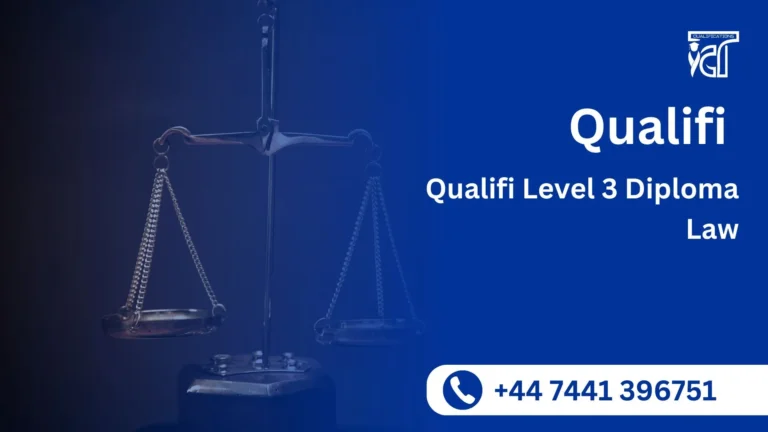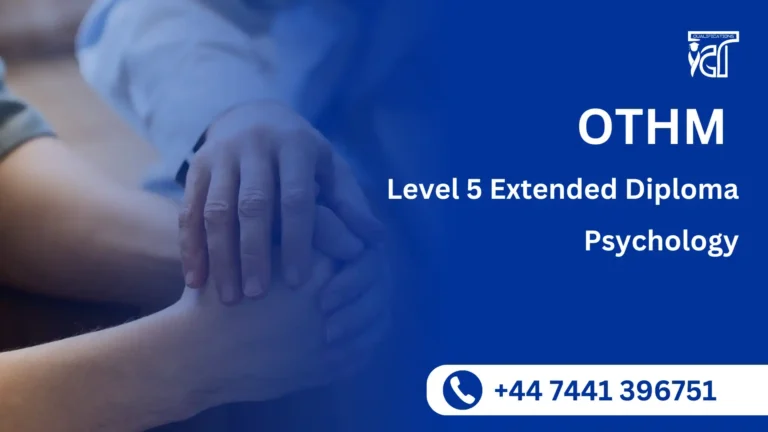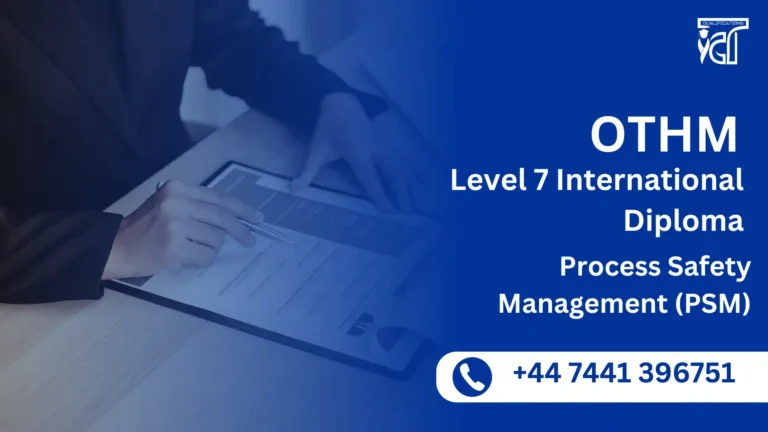The OTHM Level 7 Diploma in Environmental and Sustainability Management is a globally recognized qualification designed for professionals seeking to enhance their expertise in environmental management and sustainability. Regulated by Ofqual (the Office of Qualifications and Examinations Regulation), this advanced diploma offers learners the opportunity to develop essential skills and knowledge to address the growing demand for sustainability in today’s business and organizational environments.
This qualification is entirely assignment-based, ensuring that learners engage in practical, real-world problem-solving, making it an ideal choice for professionals who prefer applying theory directly to practice.
With increasing global awareness of environmental issues such as climate change, pollution, and resource depletion, businesses and organizations are under mounting pressure to adopt sustainable practices. Governments, corporations, and individuals are seeking innovative solutions to balance economic development with environmental protection.
The OTHM Level 7 Diploma in Environmental and Sustainability Management is an ideal qualification for professionals seeking to elevate their careers in the ever-evolving field of environmental management. With a focus on practical learning, real-world applications, and strategic leadership, this qualification provides all the tools needed to thrive in today’s competitive job market.
OTHM Level 7 Diploma in Environmental and Sustainability Management
The OTHM Level 7 Diploma in Environmental and Sustainability Management qualification comprises 4 mandatory units and 5 optional units, with candidates required to complete a total of 6 units. The qualification is worth 120 credits, with a Total Qualification Time (TQT) of 1200 hours. The recommended minimum Guided Learning Hours (GLH) for this qualification is 600 hours.
| Sr# | Unit Title | Credits | GLH |
|---|---|---|---|
| 1 | Fundamentals of Sustainability | 20 | 100 |
| 2 | Environmental Science and Energy Transition | 20 | 100 |
| 3 | Environmental Management in Organisations | 20 | 100 |
| 4 | Research Methods | 20 | 100 |
| Optional Units | |||
| 5 | Delivering Transformational Change | 20 | 100 |
| 6 | Advanced Principles of Net Zero | 20 | 100 |
| 7 | Environmental Politics and Policies | 20 | 100 |
| 8 | Sustainable Finance | 20 | 100 |
| 9 | Sustainability as a Business Strategy | 20 | 100 |
GLH (Guided Learning Hours) and TQT (Total Qualification Time) are terms commonly used in vocational qualifications to help define the amount of time a learner is expected to spend on heir studies.
1. GLH (Guided Learning Hours)
GLH refers to the number of hours a learner spends being directly taught, supervised, or supported during their course. This includes the time spent in activities such as:
- Classroom instruction
- Practical workshops
- One-on-one tutoring or mentoring sessions
- Online learning sessions with tutor support
In other words, GLH represents the time that learners are actively engaged with their instructors or learning activities.
2. TQT (Total Qualification Time)
TQT represents the total amount of time a learner is expected to invest in completing a qualification, including:
- GLH (Guided Learning Hours): Time spent on direct learning, as explained above.
- Self-Directed Learning: This includes time spent on independent study, research, assignment completion, preparation for exams, and any other work the learner does outside of direct teaching hours.
TQT is a broader measure that includes all the time required to achieve the qualification. It helps learners and employers understand the overall commitment required for the qualification.
Key Differences Between GLH and TQT:
- GLH focuses on direct learning with guidance or supervision.
- TQT includes GLH as well as independent study time and other learning-related activities.
Example:
If a qualification has a TQT of 600 hours and a GLH of 250 hours, it means the learner should spend 250 hours in direct learning (classroom, online, or tutor-led sessions) and 350 hours on independent study or research.
Learning Outcomes of OTHM Level 7 Diploma in Environmental and Sustainability Management
Fundamentals of Sustainability
- Understand the key concepts of sustainability and their relation to economic growth and development.
- Understand the context of sustainability and the reasons for urgent action, with a special focus on climate change and biodiversity.
- Understand the role of private enterprises and innovation in the transition to sustainability
- Understand the need for global initiatives and treaties on sustainability and climate change.
- Understand the principles and perspectives of business ethics and its use in discussions regarding climate change and sustainability.
Environmental Science and Energy Transition
- Understand the physics of the energyrelated carbon cycle and its impact on temperature
- Understand the physical principles of harvesting renewable alternatives to fossil fuels and the technological and market developments within this area.
- Understand the physical principles of non-renewable alternatives to fossil fuels, the political sensitivities of nonrenewables and the technological, and market developments related to these sources of energy.
- Understand the dependence of alternative energy sources on storage and grid management
- Understand the trilemma of energy transformation and the need for national policies and international cooperation.
Environmental Management in Organisations
- Understand topics relevant for environmental management and the reasons why organisations should choose to manage them.
- Understand environmental assessment and management tools and their advantages and disadvantages.
- Understand how to develop and deliver environmental performance improvement.
- Understand approaches collection, analysis, reporting and communication of environmental data.
Research Methods
- Be able to develop research approaches in a suitable context.
- Be able to critically review literature on a business research topic.
- Be able to design business research methodologies.
- Be able to develop a research proposal.
Delivering Transformational Change
- Understand how to conduct a materiality assessment to understand priorities for change and change readiness.
- Understand key techniques, practices, behaviours, and knowledge of change management.
- Understand the behaviour of complex systems and how to change them.
- Understand how a leader’s style and approach has a major impact on both team and individual performance, values, and motivations.
- Understand the meaning and purpose of ESG Governance Structure and how to develop it.
Advanced Principles of Net Zero
- Understand the meaning and importance of “net zero” at a conceptual level.
- Understand the application of the fundamentals of Greenhouse Gas (GHG) Accounting.
- Understand science-based targets and their facilitating role to deliver net zero.
- Understand how to communicate an organisation’s response to climate change, net zero pledges and green claims.
- Understand how and to which extent organisations and society can adapt to climate change
Environmental Politics and Policies
- Understand principles and examples of environmental policy and legislation.
- Understand the role of ethics in international climate agreements and governance.
- Understand economic instruments available to effect change related to environmental and social issues
- Understand suasive instruments available to effect change related to environmental and social issues.
- Understand key international agreements related to environmental governance and climate change politics
- Understand the UN Sustainable Development Goals (SDG) and the importance of the sustainability agenda.
Sustainable Finance
- Understand the relevance of the Financial Industry to sustainability across different financial instruments and asset classes.
- Understand how physical and transition risks, particularly those related to climate change, translate to financial risks and how this is managed by financial organisations and central banks.
- Understand sustainable / ESG financing strategies and products that facilitate sustainable transition and development.
- Understand the value and use of ESG ratings and labels.
Sustainability as a Business Strategy
- Understand the relationship between Economics and Sustainability and the four rationales of why sustainability is in businesses’ interest.
- Understand how sustainability impacts businesses’ value chain and how companies can capitalise on being sustainable.
- Understand the limitations of “traditional” accounting and the need to approach the concept of value holistically.
- Understand the concept of the circular economy, circular business models and the challenges related to operating and financing circular businesses
- Understand the role of marketing and stakeholder engagement in the transition to sustainability and the risks of poor marketing practices.
- Industry-Recognized Qualification
The OTHM Level 7 Diploma in Environmental and Sustainability Management is an Ofqual-regulated qualification, ensuring that it meets high academic and professional standards. This recognition makes it a credible and valuable qualification in the field of environmental management. - Career Advancement Opportunities
Completing this diploma opens up a wide range of career opportunities in sustainability and environmental management. Whether you’re aiming for leadership roles such as Sustainability Manager, Environmental Consultant, or CSR Director, this qualification provides the knowledge and skills to excel in senior positions. - Practical, Real-World Learning
The course is entirely assignment-based, focusing on practical application rather than exams. This method encourages learners to solve real-world environmental problems, apply their knowledge to practical situations, and develop solutions that can be immediately implemented in the workplace. - Comprehensive Curriculum
The diploma covers essential areas of environmental management and sustainability, including policies, climate change, resource management, and environmental impact assessments. This in-depth curriculum ensures that learners gain a well-rounded understanding of the field. - Flexible Learning
The self-paced learning model allows you to study the course while balancing your professional and personal commitments. You can complete assignments at your own pace, making this qualification suitable for busy professionals. - Enhanced Leadership Skills
This qualification equips you with the leadership and strategic management skills needed to drive sustainability initiatives within organizations. You’ll learn how to manage sustainability projects, lead teams, and influence policy and decision-making at the highest levels. - Global Relevance
As sustainability becomes increasingly critical worldwide, professionals with expertise in this field are in high demand. This qualification positions you to meet global environmental challenges, making it relevant for organizations across various industries and countries. - Networking and Professional Growth
The OTHM Level 7 Diploma connects you with professionals from diverse sectors and backgrounds, providing opportunities to network, share ideas, and grow within the field. - Foundation for Further Studies
For those wishing to continue their academic journey, this diploma serves as a strong foundation for pursuing advanced qualifications or certifications in environmental law, climate change, or corporate sustainability. - High Earning Potential
With the growing demand for sustainability professionals, individuals with an OTHM Level 7 Diploma in Environmental and Sustainability Management often enjoy higher earning potential and career stability in this expanding field.
The ideal learner for the OTHM Level 7 Diploma in Environmental and Sustainability Management is a motivated and forward-thinking professional seeking to advance their career in environmental management and sustainability. This qualification is designed for individuals who are passionate about making a positive impact on the environment and driving sustainable practices within organizations.
Key Characteristics of the Ideal Learner:
- Educational Background:
- The ideal learner should have an undergraduate degree in Environmental Science, Business, Management, or a related field.
- Alternatively, significant professional experience in a management or leadership role within environmental or sustainability-related sectors can also be considered.
- Professional Experience:
- The learner is typically a mid-career professional with at least 2-3 years of experience in the environmental, sustainability, or related industries.
- They may currently hold a management or leadership position, such as Environmental Manager, Sustainability Consultant, or CSR Officer, and are looking to advance their expertise or transition into higher roles.
- Leadership and Strategic Mindset:
- The ideal learner has aspirations to take on senior roles that involve managing and leading sustainability initiatives, shaping policies, and driving environmental change within organizations.
- They are eager to develop strategic management skills and learn how to influence decision-making and sustainability practices at the organizational level.
- Passion for Sustainability and the Environment:
- The learner is deeply committed to sustainability and passionate about environmental protection. They have a strong desire to help organizations adopt practices that reduce environmental impact and support sustainable development goals (SDGs).
- Critical Thinking and Problem-Solving:
- The ideal learner is a critical thinker who can assess complex environmental challenges and devise practical solutions to address them.
- They are able to integrate sustainability principles into business strategies and decision-making processes.
- Good Communication Skills:
- Strong communication skills, both written and verbal, are essential for the ideal learner to effectively collaborate with stakeholders, influence key decisions, and present ideas clearly.
- They should be comfortable reporting on environmental performance and presenting recommendations to senior management or external clients.
- Self-Motivation and Time Management:
- The learner should be self-motivated, with the ability to manage their time efficiently to balance work, study, and personal commitments.
- Since the qualification is assignment-based, they should be comfortable with independent learning and applying theoretical knowledge to real-world scenarios.
- Global Perspective:
- The ideal learner is someone who understands the global importance of sustainability and is keen to address challenges on an international scale.
- They may work in multinational organizations or aim to influence global sustainability efforts in both the public and private sectors.
Entry Requirements
Register Now
Qualification Process
Qualification Process for the OTHM Level 7 Diploma in Environmental and Sustainability Management
- Self-Assessment:
Begin by evaluating your eligibility to ensure you meet the qualification requirements, including work experience, knowledge, and language proficiency. - Registration:
Complete your registration by submitting the required documents, including a scanned copy of a valid ID, and paying the registration fee. - Induction:
An assessor will conduct an induction to confirm your eligibility for the course and explain the evidence requirements. If you do not meet the criteria, your registration will be canceled, and the fee will be refunded. - Assignmnets & Evidence Submission:
Provide all assignmnets and the necessary evidence based on the assessment criteria outlined in the course. If you are unsure of the required evidence, consult with the assessor for guidance on the type and nature of evidence needed. - Feedback and Revision:
The assessor will review your submitted evidence and provide feedback. Evidence that meets the criteria will be marked as “Criteria Met,” while any gaps will be identified. You will be asked to revise and resubmit if needed. - Competence Evidence:
Submit final evidence demonstrating that all learning outcomes have been met. This evidence will be marked as “Criteria Met” by the assessor once it is satisfactory. - Internal Quality Assurance (IQA):
The Internal Quality Assurance Verifier (IQA) will review your evidence to ensure consistency, quality, and compliance with standards. - External Verification:
The IQA will submit your portfolio to OTHM External Quality Assurance Verifiers (EQA) for final confirmation. The EQA may contact you directly to verify the authenticity of your evidence. - Certification:
Upon successful completion of all checks, OTHM will issue your official certificate, confirming that you have attained the OTHM Level 7 Diploma in Environmental and Sustainability Management







